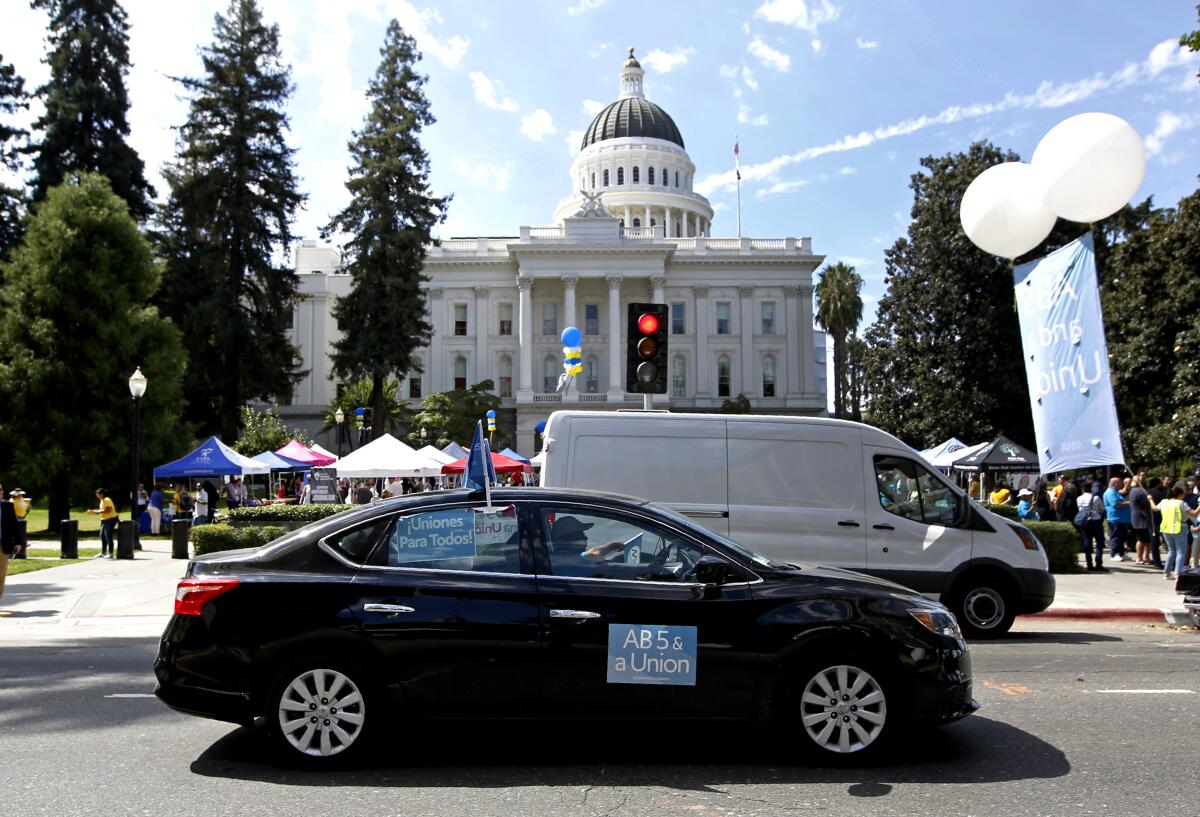Lawmakers and lobbyists scramble as California’s legislative session draws to a close

- Share via
SACRAMENTO — For several hours last week, big trucks circled the state Capitol bumper-to-bumper, blaring their horns and clogging traffic.
The truckers were trying to get the politicians’ attention and honk a message: They demanded to be exempted from organized labor’s “gig” bill that would reclassify them as company employees rather than what they are: independent contractors.
They got everyone’s attention, all right, but also annoyed them. How’d you like to hear constant ear-deafening truck belching while you’re trying to work? Or to be distracted by all that greenhouse gas being emitted?
Anyway, it didn’t work. Might have even backfired. The independent long-haul truckers were not exempted from the bill. Tow truck drivers were, however, because they might work for several companies. But so might long-haulers. It defies logic.
At least that’s how the bill stood this weekend. This year’s legislative session still has five days to go and little is certain.
It’s the desperate season for interests and lobbyists, when legislating is intense. It’s when lobbyists earn their pay and legislators fetch their political donations.
Sometimes, however, it’s only about logic and emotion.
The best example this year has been the bill to rid California of vaccination exemption mills run by unscrupulous doctors. Anti-vaxxers lobbied against the bill by screaming during public hearings and viciously attacking the character of the measure’s author, Sen. Richard Pan (D-Sacramento), a physician. That didn’t work either.
The bill passed the Legislature last week and was sent to Gov. Gavin Newsom. But the governor damaged himself with legislators by devaluing the worth of his word.
In June, Newsom promised to sign the bill if Pan accepted certain changes to water it down. Pan did. But immediately after the bill passed the Assembly last week, Newsom announced he wanted more changes, hinting he’d veto the measure if he didn’t get them. The governor and the senator compromised on new amendments that will be inserted into a separate bill this week.
Bottom line: Newsom broke his promise to sign the bill with only the first changes. Maybe lawmakers should get future gubernatorial pledges in writing.
With the year’s session nearing a hectic end, bills have been flying out of each house seemingly one a minute. No time for debate.
But it’s only the first half of a two-year session. Measures that are blocked this year get another shot in 2020.
The gig bill demonstrates organized labor’s unrivaled power in a state Capitol controlled 100% by one party, the Democrats. It’s dominated by leftists and holds supermajorities in each legislative house.
Labor unions are the Democrats’ core campaign supporters, so there’s no stopping the gig bill, especially when the governor endorses it on Labor Day.
“While the wealthiest have grown wealthier, the middle class and working people have grown poorer,” Newsom wrote in a Labor Day op-ed for the Sacramento Bee, sounding a bit like Vermont Sen. Bernie Sanders. “Corporate profits have gone through the roof while worker pay has remained in the basement.
“Contributing to this imbalance is the misclassification of workers, where companies eager to save on labor costs identify workers as ‘independent contractors’ rather than employees. Workers lose basic protections like minimum wage, paid sick days and health insurance benefits.”
And punctuating the point that the gig bill is about potentially signing up new union members, Newsom wrote: “Creating new ways for workers to organize is a key component of tackling the level of inequality that undermines our entire economy.”
The bill, AB 5 by Assemblywoman Lorena Gonzalez (D-San Diego), is on the Senate floor. It would enshrine in state law a 2018 ruling by the state Supreme Court that significantly increased the types of workers entitled to benefits provided to regular employees.
Tow truckers, dog groomers and school tutors were exempted Friday. Those previously exempted included doctors, lawyers, insurance brokers, real estate agents, some freelance writers and commercial fishermen. But not Uber and Lyft drivers, or newspapers deliverers.
Gonzalez, a former union organizer, says she’s through exempting people. We’ll see.
“A lot of people are lobbying to get exempt,” says Allan Zaremberg, president of the California Chamber of Commerce. “But only if you have a lobbyist do you get an exemption. That’s not a good way to make law.”
No bill has been more aggressively lobbied — mainly behind the scenes — than one that would direct the state to sell $20 billion in tax-free bonds on behalf of bankrupt Pacific Gas & Electric Co. The utility’s shareholders would pay off the bonds, PG&E says. The bond money would help PG&E reimburse victims of wildfires it’s liable for.
But the bill’s author, Assemblyman Chad Mayes (R-Yucca Valley), shelved the measure until January on Friday. PG&E’s name is so toxic in the Capitol he couldn’t muster enough votes.
What’s really going on is an aggressive effort by a competing investor group led by billionaire Paul Singer, a major Republican donor, to buy out PG&E. His lobbyist team succeeded in tainting the bond bill as a PG&E “bailout,” frightening off legislators. Without the tax-free bond, the utility is more vulnerable to a takeover.
Here’s another bitter battle: K-12 schools and community colleges want to place a $13-billion construction bond on the primary election ballot in March. The state universities have butted in with Newsom’s support and are trying to grab large chunks of the proposed bond, substantially reducing the shares for schools and community colleges.
That also will be fought out this week.
Plea to the CHP: Ticket any blaring trucks.
More to Read
Sign up for Essential California
The most important California stories and recommendations in your inbox every morning.
You may occasionally receive promotional content from the Los Angeles Times.











